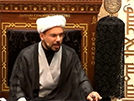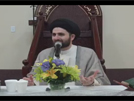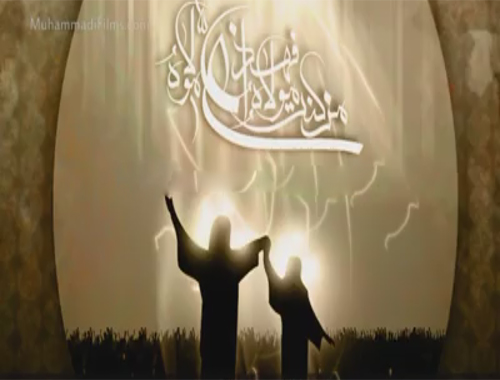1-The Islamic Faith - an Introduction
- Details
- Hits: 3957
1-The Islamic Faith - an Introduction
Question:
What is Islam?
Answer:
Islam is both a faith and a legal system (shari‘a) which provides for all the needs of a human being at every stage of his or her life.
Question:
Who established Islam?
Answer:
Islam did not come into being through human deliberation. On the contrary, it has been revealed by God Almighty as something perfect and complete without any defect.
Question:
Can Islam survive forever and is it valid for every time, place and nation?
Answer:
God Almighty has revealed Islam to be the faith of all mankind forever, relevant in every age, place and nation.
Question:
On whom was Islam revealed?
Answer:
God Almighty revealed Islam to the last of his prophets, the Prophet Mohammad (sallallahu ‘alayhi wa-alihi wa-sallam, God’s blessings and peace be upon him and his progeny).1
Question:
At what time did the Prophet of Islam live?
Answer:
He lived fourteen centuries ago, that is nearly five centuries after Jesus Christ (peace be upon him), and this present year, which is 1387/1967, one thousand and four hundred years have passed since Islam was established.
Question:
What is the difference between the Islamic faith, and the Christian, Jewish and other faiths?
Answer:
Religious systems that have been revealed by God Almighty are many, each of them being suitable for its own time, and whenever a new religion came the older faith would be abrogated. So is the case with Islam which is the last religion revealed by God for the guidance and leadership of mankind. It can be said that the difference between religions is similar to the difference between today’s educational institutions: elementary school, secondary school and university in that as mankind advanced a new religious system would be revealed appropriate to the stage which had been reached, until the time came when Islam was proclaimed as the religion of mankind for all time.
All religions share the same common essence and their difference lies in details and certain characteristics which have developed according to the advancement of the human race.
Question:
Does Islam develop or not?
Answer:
Islam has two aspects:
1. The fixed and unchanging aspect of Islam in which there is no place for development, and in which if changes were to take place there would only be insanity and confusion. In this category falls the exhortation to the telling of the truth and trustworthiness; finding repugnant oppression and miserliness; the prohibition of hoarding and murder; the obligation to pray and fast and to seek the consent of both parties in a sale or purchase and so on.
2. The second aspect of Islam is where change and alteration are legitimate. Islam has enunciated overall principles that can be applied to matters that undergo development. For example, means of transport have changed from four-legged animals to carriages and have then developed further to motorcars and trains, and then to aeroplanes and missiles. The means of lighting have gone from candle to oil lamps and from there to electricity and nuclear power. Islam allows such developments and in fact encourages them in all these spheres.
Question:
Is Islam sufficient for all man’s needs? And how are those needs fulfilled?
Answer:
Islam is sufficient for all man’s needs because it is a faith that God has revealed in such a manner that it can be applied to all aspects of life.
You ask, how can Islam be all sufficient? This is because the Holy Qur’an and the sunna1 have set out two types of laws:
1. Laws which relate particularly to a specific issue such as forbidding the drinking of wine.
2. Laws which establish a general principle such as the one forbidding the imbibing of anything that intoxicates.
Question:
How can you say that Islam is sufficient for all man’s needs seeing that now new matters and problems have arisen which are not mentioned in the Qur’an or Sunna such as banks or insurance? Such things did not exist at the time of the advent of Islam?
Answer:
Since Islam is the Faith revealed by God for the guidance of mankind for all time and God is omniscient, Islam therefore enters into all man’s affairs even those of recent manifestation. The two examples that you mentioned are also covered by general principles enunciated in Islamic Law.
Banking operations consist of various matters which have been dealt with by the Shari‘a as, for instance, borrowing money, security on a loan and a transference transaction. Insurance is covered by the Qur’anic verse: “… except that it be trading by your mutual consent”[4: 29]. Elsewhere it is stated: “… fulfill [your] contracts”[5: 1]. These orders depend upon conditions that have been described in the books on Islamic jurisprudence (fiqh).
Question:
Why do we need Islam?
Answer:
Islam, as mentioned before, is a faith and shari‘a.
Islamic faith is firstly the unchanging reality: one who does not believe in it has believed in something that is based on a fiction. Secondly, a great loss in the hereafter will be the lot of one who does not believe in Islam. Moreover, anyone not bound by the Islamic Shari‘a, will not obtain true happiness in this world to say nothing of the punishments of the hereafter. Indeed the Islamic Shari‘a is the best of all legal systems, better than man-made laws which also seek to improve man’s lot at every stage of his life. In brief, the happiness of man in this world and the hereafter is conditional upon whether or not he has believed in Islam
Question:
Firstly, how do we know that after this life there is another existence called the hereafter and that the happiness of man depends upon whether or not he is a Muslim? Moreover, what is your proof that the Islamic Shari‘a is superior to all laws and codifications and thus is able to deal best with man’s condition, whereas other religions do not possess such capability?
Answer:
The proof of the existence of the hereafter after this world can be obtained from the arguments set out in the books of Islamic Philosophy (kalam). Similarly modern psychological fields of knowledge like magnetic hypnosis, hypnotism, spiritualism (recalling the spirits of the dead) and so on prove that after death the spirit remains eternal.1
Moreover, proof of the superiority of the Islamic Shari‘a and its being better than all other laws and codifications can be seen by comparing how Islamic laws and all man-made legal systems deal with man's various needs.2
Question:
What is the total number of Muslims today in the world?
Answer:
The exact figure is not known, but according to statistics found in certain books and journals this figure is as high as “800 million”.3
Question:
Where do Muslims live?
Answer:
There are Muslims in nearly all the countries of the world but the majority of them live in Asia and Africa.[1]
Question:
Are Muslims of the belief that their religion will finally become the religion of all the people on earth?
Answer:
Yes, Muslims are of the belief that their religion will become the religion of all those on earth and the time will come when there will no longer be even one non-Muslim. The Qur’an has also promised the same and proclaims “that He may make it (Islam) prevail over all the religions”[48: 28].
In several hadiths1 that have been quoted from the Prophet and the pure Imams, it has been made clear that at the end of time a man from the Prophet’s descendants by the name of “Imam al-Mahdi” (peace be upon him) will appear and will consequently spread Islam throughout the whole world.2
Question:
How does Islam see this life? Is Islam a religion concerned for the material life or just about the spiritual life, or about both?
Answer:
The Islamic viewpoint about this life and the material and spiritual aspects of man's existence are summed up in the Almighty’s words in the Qur’an where He says:
“And among them is he who says: ‘O Our Lord! Give us in this world that which is good and in the hereafter that which is good, and save us from the torment of the Fire’ ”[2: 201].
The Prophet Muhammad (God’s blessings and peace be upon him and his progeny) says: “One who renounces his worldly affairs for the life of the hereafter is not from among us, and one who renounces the life of the hereafter for his worldly affairs is also not from among us”.3
He also says: “Strive for your world in such a manner as if you will live for ever and for the life of the hereafter act in such a way as if you will die tomorrow”4.
Question:
What were the boundaries of the Islamic World in the previous centuries and what are they at the present time? How did Islam spread?
Answer:
Information about these two topics requires extensive study of various books but a summary can be found by a perusal of the study of a map of the Islamic World and the book “Invitation towards Islam”.











